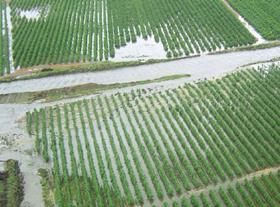
The Intergovernmental Panel on Climate Change (IPCC) has released a report detailing the effects climate change could have on land and food security, which could impact all areas of the fresh produce supply chain.
The Special Report onClimate Change and Land was released on 8 August and highlighted the ways in which climate change can exacerbate land degradation and how climate change is affecting all four pillars of food security.
The four pillars outlined were: availability (yield and production), access (prices and ability to obtain food), utilisation (nutrition and cooking), and stability (disruptions to availability).
“Food security will be increasingly affected by future climate change through yield declines – especially in the tropics – increased prices, reduced nutrient quality, and supply chain disruptions,” said Priyadarshi Shukla, co-chair of IPCC Working Group III.
“We will see different effects in different countries, but there will be more drastic impacts on low-income countries in Africa, Asia, Latin America and the Caribbean,” he said.
The potential effects of an increase in global temperature could also increase the risk of soil erosion on croplands, the risk of desertification and aggravate a range of other threats to producers.
“New knowledge shows an increase in risks from dryland water scarcity, fire damage, permafrost degradation and food system instability, even for global warming of around 1.5°C,” said Valérie Masson-Delmotte, co-chair of IPCC Working Group I.
“Very high risks related to permafrost degradation and food system instability are identified at 2°C of global warming,” she said.
However, there is some optimism in the report for producers as it recommends an increase in plant-based diets including fruit and vegetables to help limit climate change.
“The choices we make about sustainable land management can help reduce, and in some cases, reverse these adverse impacts,” said Kiyoto Tanabe, co-chair of the Task Force on National Greenhouse Gas Inventories.



